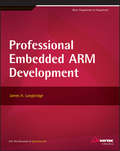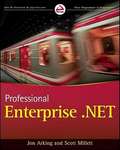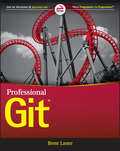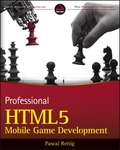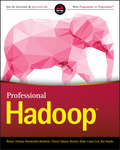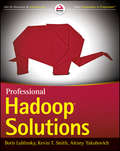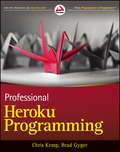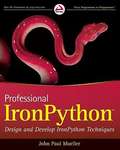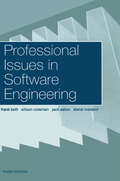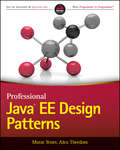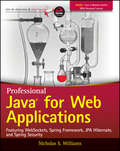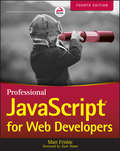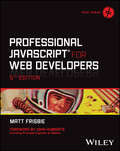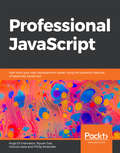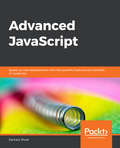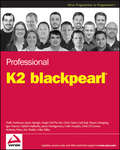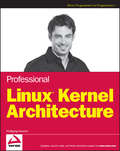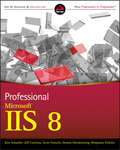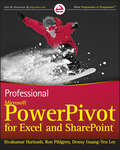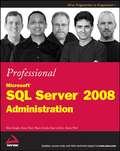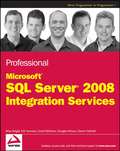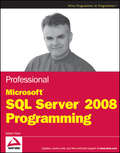- Table View
- List View
Professional Embedded ARM Development
by James A. LangbridgeA practical Wrox guide to ARM programming for mobile devicesWith more than 90 percent of mobile phones sold in recent years using ARM-based processors, developers are eager to master this embedded technology. If you know the basics of C programming, this guide will ease you into the world of embedded ARM technology. With clear explanations of the systems common to all ARM processors and step-by-step instructions for creating an embedded application, it prepares you for this popular specialty. While ARM technology is not new, existing books on the topic predate the current explosive growth of mobile devices using ARM and don't cover these all-important aspects. Newcomers to embedded technology will find this guide approachable and easy to understand.Covers the tools required, assembly and debugging techniques, C optimizations, and moreLists the tools needed for various types of projects and explores the details of the assembly languageExamines the optimizations that can be made to ensure fast code Provides step-by-step instructions for a basic application and shows how to build upon itProfessional Embedded ARM Development prepares you to enter this exciting and in-demand programming field.
Professional Enterprise .NET
by Scott Millett Jon ArkingComprehensive coverage to help experienced . NET developers create flexible, extensible enterprise application code If you're an experienced Microsoft . NET developer, you'll find in this book a road map to the latest enterprise development methodologies. It covers the tools you will use in addition to Visual Studio, including Spring. NET and nUnit, and applies to development with ASP. NET, C#, VB, Office (VBA), and database. You will find comprehensive coverage of the tools and practices that professional . NET developers need to master in order to build enterprise more flexible, testable, and extensible . NET applications with minimal upfront costs. Helps C#, VB. Net, and ASP. NET developers who wish to migrate both their applications and their own skillsets to newer, more flexible enterprise methodologies Describes each new pattern or feature along with its benefits, then outlines the pros and cons of its implementation Includes an introduction to enterprise development and a comprehensive overview of the differences between new enterprise patterns and older, traditional Microsoft programming Explains how to implement these patterns by upgrading an existing code base Covers benefits including flexibility, automated testing, extensibility, and separation; modular code; test-driven development, unit test, test automation, and refactoring; inversion of control; and object relational mapping Also covers enterprise design patterns: MVC including Ruby on Rails, Monorail, and ASP. NET MVC, MVP, observer, and more Contains a primer on object-oriented design Professional Enterprise . NET focuses on the often-inevitable compromise between forward-thinking design and the needs of business, helping you build applications that serve both.
Professional Git
by Brent LasterLeverage the power of Git to smooth out the development cycle Professional Git takes a professional approach to learning this massively popular software development tool, and provides an up-to-date guide for new users. More than just a development manual, this book helps you get into the Git mindset—extensive discussion of corollaries to traditional systems as well as considerations unique to Git help you draw upon existing skills while looking out—and planning for—the differences. Connected labs and exercises are interspersed at key points to reinforce important concepts and deepen your understanding, and a focus on the practical goes beyond technical tutorials to help you integrate the Git model into your real-world workflow. Git greatly simplifies the software development cycle, enabling users to create, use, and switch between versions as easily as you switch between files. This book shows you how to harness that power and flexibility to streamline your development cycle. Understand the basic Git model and overall workflow Learn the Git versions of common source management concepts and commands Track changes, work with branches, and take advantage of Git's full functionality Avoid trip-ups and missteps common to new users Git works with the most popular software development tools and is used by almost all of the major technology companies. More than 40 percent of software developers use it as their primary source control tool, and that number continues to grow; the ability to work effectively with Git is rapidly approaching must-have status, and Professional Git is the comprehensive guide you need to get up to speed quickly.
Professional HDR Photography
by Mark ChenBuilding on a professional photographer's on-the-job experience using the high dynamic range (HDR) imaging technique, which captures an astounding range of tones that far exceeds the native abilities of any camera, this guide shows serious photographers how a more sophisticated approach to HDR can produce images that lack visual pretense, stand the test of time, and realistically capture details that would otherwise elude the photographer. It demonstrates the basic procedure for creating an HDR image step-by-step, then explores progressively more complex and refined techniques that can be applied as the scene dictates or the artist’s personal aesthetic requires. Ample image sequences with plenty of screen shots let the reader follow the entire process through from start to finish. Unique techniques are presented for the treatment of special subjects, ranging from landscapes to still lifes and portraits. Ultimately, the handbook demonstrates that HDR imaging is a powerful tool and the professional photographers who take the time to fully master its potential can mean substantial rewards, both creatively and financially.
Professional HTML5 Mobile Game Development
by Pascal RettigCreate mobile game apps for the lucrative gaming market If you're an experienced developer seeking to break into the sizzling mobile game market, this is the book for you. Covering all mobile and touchscreen devices, including iPhones, iPads, Android, and WP7. 5, this book takes you through the steps of building both single- and multi-player mobile games. Topics include standard patterns for building games in HTML5, what methods to choose for building (CSS3, SVG, or Canvas), popular game engines and frameworks, and much more. Best of all, code for six basic games is provided, so you can modify, further develop, and make it your own. Shows intermediate developers how to develop games in HTML5 and build games for iPhone, iPad, Android, and WP7. 5 mobile and touchscreen devices Explains single-player and multi-player mobile game development Provides code for six basic games in a GitHub repository, so readers can collaborate and develop the code themselves Explores specific APIs to make games even more compelling, including geolocation, audio, and device orientation Reviews three popular open-source HTML5 game engines--crafty. js, easel. js, and enchant. js Covers simple physics as well as using an existing physics library The world is going mobile, as is the game industry. Professional HTML5 Mobile Game Development helps savvy developers join in this exploding market.
Professional Hadoop
by Kai Sasaki Benoy Antony Konstantin Boudnik Cheryl Adams Branky Shao Cazen LeeThe professional's one-stop guide to this open-source, Java-based big data framework Professional Hadoop is the complete reference and resource for experienced developers looking to employ Apache Hadoop in real-world settings. Written by an expert team of certified Hadoop developers, committers, and Summit speakers, this book details every key aspect of Hadoop technology to enable optimal processing of large data sets. Designed expressly for the professional developer, this book skips over the basics of database development to get you acquainted with the framework's processes and capabilities right away. The discussion covers each key Hadoop component individually, culminating in a sample application that brings all of the pieces together to illustrate the cooperation and interplay that make Hadoop a major big data solution. Coverage includes everything from storage and security to computing and user experience, with expert guidance on integrating other software and more. Hadoop is quickly reaching significant market usage, and more and more developers are being called upon to develop big data solutions using the Hadoop framework. This book covers the process from beginning to end, providing a crash course for professionals needing to learn and apply Hadoop quickly. Configure storage, UE, and in-memory computing Integrate Hadoop with other programs including Kafka and Storm Master the fundamentals of Apache Big Top and Ignite Build robust data security with expert tips and advice Hadoop's popularity is largely due to its accessibility. Open-source and written in Java, the framework offers almost no barrier to entry for experienced database developers already familiar with the skills and requirements real-world programming entails. Professional Hadoop gives you the practical information and framework-specific skills you need quickly.
Professional Hadoop Solutions
by Boris Lublinsky Kevin T. Smith Alexey YakubovichThe go-to guidebook for deploying Big Data solutions with HadoopToday's enterprise architects need to understand how the Hadoop frameworks and APIs fit together, and how they can be integrated to deliver real-world solutions. This book is a practical, detailed guide to building and implementing those solutions, with code-level instruction in the popular Wrox tradition. It covers storing data with HDFS and Hbase, processing data with MapReduce, and automating data processing with Oozie. Hadoop security, running Hadoop with Amazon Web Services, best practices, and automating Hadoop processes in real time are also covered in depth. With in-depth code examples in Java and XML and the latest on recent additions to the Hadoop ecosystem, this complete resource also covers the use of APIs, exposing their inner workings and allowing architects and developers to better leverage and customize them.The ultimate guide for developers, designers, and architects who need to build and deploy Hadoop applicationsCovers storing and processing data with various technologies, automating data processing, Hadoop security, and delivering real-time solutionsIncludes detailed, real-world examples and code-level guidelinesExplains when, why, and how to use these tools effectivelyWritten by a team of Hadoop experts in the programmer-to-programmer Wrox styleProfessional Hadoop Solutions is the reference enterprise architects and developers need to maximize the power of Hadoop.
Professional Heroku Programming
by Chris Kemp Brad GygerA complete guide to building and deploying web apps with HerokuA cloud application platform, Heroku is currently the only approved platform for creating apps within Facebook, and its number of users is growing at rapid pace. However, there are very few books on the market that offer professional-level coverage of this platform, until now. The author duo begins with an introduction to the Heroku platform and its associated core concepts and then goes on to explain how writing for this platform differs from that of traditional development systems. Example applications, additional resources, and advice for your next steps round out this resource, making it a thorough, indispensable guide. Features information not found anywhere else, as both authors work for HerokuExplains the inner workings of Heroku with special emphasis placed on building web and mobile applicationsIntroduces GIT-based development workflow and the process model within the Heroku platformDetails coding, building, deploying, and scaling effectively using the Heroku tool baseProviding you with fully functional code and downloadable code examples, Professional Heroku Programming is your complete guide to mastering this platform.
Professional IIS 7
by Jeff Cochran Ken Schaefer Scott Forsyth Rob Baugh Mike Everest Dennis GlendenningAs the first update to Microsoft's server operating system in nearly five years, Windows Server 2008 boasts the new Internet Information Services 7. 0 (IIS 7), which is the largest departure from previous versions of IIS ever. Written by an author team that includes four Microsoft MVPs, this book shows you how to take advantage of these exciting new features of IIS 7. With a clear understanding of IIS 7, you'll learn to deploy, install, monitor, manage, and secure an IIS environment with confidence and ease. Note: CD-ROM/DVD and other supplementary materials are not included as part of eBook file.
Professional IronPythonTM
by John Paul MuellerThorough coverage of Microsoft's new dynamic programming language: IronPython IronPython is a powerful and vital part of any . NET developer's toolbox, and although it is several years old, very little literature exists on the topic. This essential resource fills that void and provides you with an in-depth understanding of IronPython. A brief introduction walks you through the installation, usage, and tools of IronPython and also explains what makes IronPython different from other programming languages. Coverage quickly moves on to explaining how to use and work with the IronPython language, and an in-depth look at its environment sheds light on how it can be stand alone or with the . NET Framework. You'll see how IronPython can be used to create either desktop or Web-based applications and you'll witness how it interacts with other existing technologies. In addition, coverage of advanced topics shares techniques for extending IronPython and making it a robust language. Provides you with an in-depth look at IronPython, how it is different from other programming languages, what it is capable of, and how to maximize its potential Explores how IronPython interacts with existing technologies and how it can perform administration tasks Answers popular questions, such as how to extend IronPython and make it a more robust language Tackles topics not addressed anywhere else, including executing IronPython using Mono You'll want to devour every topic covered in Professional IronPython so you can get started working with this powerful programming language today.
Professional Issues in Software Engineering
by Allison Coleman Diane Rowland Frank BottSoftware engineers are increasingly becoming business people; Professional Issues in Software Engineering, 3rd Edition gives them comprehensive coverage of the issues they should know about. While most books look at programs related to software engineering rather than the context in which they are used, this book covers the major developments that have occured in recent years, such as the Internet, Data Protection Act, and changes to the legal status of software engineers. This updated edition of a successful textbook is for undergraduate and graduate students as well as for professionals in software engineering and computer science.
Professional Java EE Design Patterns
by Murat Yener Alex TheedomMaster Java EE design pattern implementation to improve your design skills and your application's architectureProfessional Java EE Design Patterns is the perfect companion for anyone who wants to work more effectively with Java EE, and the only resource that covers both the theory and application of design patterns in solving real-world problems. The authors guide readers through both the fundamental and advanced features of Java EE 7, presenting patterns throughout, and demonstrating how they are used in day-to-day problem solving.As the most popular programming language in community-driven enterprise software, Java EE provides an API and runtime environment that is a superset of Java SE. Written for the junior and experienced Java EE developer seeking to improve design quality and effectiveness, the book covers areas including:Implementation and problem-solving with design patternsConnection between existing Java SE design patterns and new Java EE conceptsHarnessing the power of Java EE in design patternsIndividually-based focus that fully explores each patternColorful war-stories showing how patterns were used in the field to solve real-life problemsUnlike most Java EE books that simply offer descriptions or recipes, this book drives home the implementation of the pattern to real problems to ensure that the reader learns how the patterns should be used and to be aware of their pitfalls.For the programmer looking for a comprehensive guide that is actually useful in the everyday workflow, Professional Java EE Design Patterns is the definitive resource on the market.
Professional Java for Web Applications
by Nicholas S. WilliamsThe comprehensive Wrox guide for creating Java web applications for the enterpriseThis guide shows Java software developers and software engineers how to build complex web applications in an enterprise environment. You'll begin with an introduction to the Java Enterprise Edition and the basic web application, then set up a development application server environment, learn about the tools used in the development process, and explore numerous Java technologies and practices. The book covers industry-standard tools and technologies, specific technologies, and underlying programming concepts.Java is an essential programming language used worldwide for both Android app development and enterprise-level corporate solutionsAs a step-by-step guide or a general reference, this book provides an all-in-one Java development solutionExplains Java Enterprise Edition 7 and the basic web application, how to set up a development application server environment, which tools are needed during the development process, and how to apply various Java technologiesCovers new language features in Java 8, such as Lambda Expressions, and the new Java 8 Date & Time API introduced as part of JSR 310, replacing the legacy Date and Calendar APIsDemonstrates the new, fully-duplex WebSocket web connection technology and its support in Java EE 7, allowing the reader to create rich, truly interactive web applications that can push updated data to the client automaticallyInstructs the reader in the configuration and use of Log4j 2.0, Spring Framework 4 (including Spring Web MVC), Hibernate Validator, RabbitMQ, Hibernate ORM, Spring Data, Hibernate Search, and Spring SecurityCovers application logging, JSR 340 Servlet API 3.1, JSR 245 JavaServer Pages (JSP) 2.3 (including custom tag libraries), JSR 341 Expression Language 3.0, JSR 356 WebSocket API 1.0, JSR 303/349 Bean Validation 1.1, JSR 317/338 Java Persistence API (JPA) 2.1, full-text searching with JPA, RESTful and SOAP web services, Advanced Message Queuing Protocol (AMQP), and OAuthProfessional Java for Web Applications is the complete Wrox guide for software developers who are familiar with Java and who are ready to build high-level enterprise Java web applications.
Professional JavaScript for Web Developers
by Matt FrisbieUpdate your skill set for ES 6 and 7 with the ultimate JavaScript guide for pros Professional JavaScript for Web Developers is the essential guide to next-level JavaScript development. Written for intermediate-to-advanced programmers, this book jumps right into the technical details to help you clean up your code and become a more sophisticated JavaScript developer. From JavaScript-specific object-oriented programming and inheritance, to combining JavaScript with HTML and other markup languages, expert instruction walks you through the fundamentals and beyond. This new fourth edition has been updated to cover ECMAScript 6 and 7 (also known as ES2015 and ES2016) and the major re-imagination and departure from ES 5.1; new frameworks and libraries, new techniques, new testing tools, and more are explained in detail for the professional developer, with a practical focus that helps you put your new skills to work on real-world projects. The latest—and most dramatic—ES release is already being incorporated into JavaScript engines in major browsers; this, coupled with the rise in mobile web traffic increasing demand for responsive, dynamic web design, means that all web developers need to update their skills—and this book is your ideal resource for quick, relevant guidance. Get up to date with ECMAScript 6 and 7, new frameworks, and new libraries Delve into web animation, emerging APIs, and build systems Test more effectively with mocks, unit tests, functional tests, and other tools Plan your builds for future ES releases Even if you think you know JavaScript, new ES releases bring big changes that will affect the way you work. For a professional-level update that doesn't waste time on coding fundamentals, Professional JavaScript for Web Developers is the ultimate resource to bring you up to speed.
Professional JavaScript for Web Developers
by Matt FrisbieUpdate and upgrade your JavaScript skillset for ES 2023 with the ultimate JavaScript guide for pros Professional JavaScript for Web Developers, 5th edition, is the gold-standard in intermediate-to-advanced JavaScript programming development books. The author dives directly into the inner workings of JavaScript to help you clean up your code and become a more sophisticated and talented JavaScript developer. From object-oriented programming and inheritance to combining JavaScript with HTML and other markup languages, expert computer engineer Matt Frisbie walks you through everything you need to know to level-up your JavaScript game. This new edition is updated to include ECMAScript 2023 and later standard releases, the most useful techniques, and a relentless focus on code that works seamlessly in mobile web browsers and with the latest common frameworks and libraries. With this book, you will: Get up to date with ECMAScript 2023 Get acquainted with the newest frameworks and libraries Explore advanced topics such as web animation, workers, and the latest APIs Get a head start on future ES releases Learn to use modern syntax and best practices Understand how to optimize performance in JavaScript applications Master asynchronous programming patterns using promises, generators, and async/awaitPerfect for those who think they already know JavaScript “pretty well,” Professional JavaScript for Web Developers, 5th edition, is the pro-level update that intermediate and advanced web developers have been waiting for.
Professional JavaScript: Fast-track your web development career using the powerful features of advanced JavaScript
by Hugo Di Francesco Siyuan Gao Vinicius Isola Philip KirkbrideDevelop your JavaScript programming skills by learning strategies and techniques commonly used in modern full-stack application development Key Features Write and deploy full-stack applications efficiently with JavaScript Delve into JavaScript's multiple programming paradigms Get up to speed with core concepts such as modularity and functional programming to write efficient code Book Description In depth knowledge of JavaScript makes it easier to learn a variety of other frameworks, including React, Angular, and related tools and libraries. This book is designed to help you cover the core JavaScript concepts you need to build modern applications. You'll start by learning how to represent an HTML document in the Document Object Model (DOM). Then, you'll combine your knowledge of the DOM and Node.js to create a web scraper for practical situations. As you read through further lessons, you'll create a Node.js-based RESTful API using the Express library for Node.js. You'll also understand how modular designs can be used for better reusability and collaboration with multiple developers on a single project. Later lessons will guide you through building unit tests, which ensure that the core functionality of your program is not affected over time. The book will also demonstrate how constructors, async/await, and events can load your applications quickly and efficiently. Finally, you'll gain useful insights into functional programming concepts such as immutability, pure functions, and higher-order functions. By the end of this book, you'll have the skills you need to tackle any real-world JavaScript development problem using a modern JavaScript approach, both for the client and server sides. What you will learn Apply the core concepts of functional programming Build a Node.js project that uses the Express.js library to host an API Create unit tests for a Node.js project to validate it Use the Cheerio library with Node.js to create a basic web scraper Develop a React interface to build processing flows Use callbacks as a basic way to bring control back Who this book is for If you want to advance from being a frontend developer to a full-stack developer and learn how Node.js can be used for hosting full-stack applications, this is an ideal book for you. After reading this book, you'll be able to write better JavaScript code and learn about the latest trends in the language. To easily grasp the concepts explained here, you should know the basic syntax of JavaScript and should've worked with popular frontend libraries such as jQuery. You should have also used JavaScript with HTML and CSS but not necessarily Node.js.
Professional Javascript: Speed up web development with the powerful features and benefits of JavaScript
by Zachary Shute Ayodeji JayeobaProfessional JavaScript is designed for programmers who want to write JavaScript in a professional environment. It is also good for tech-enthusiasts wondering when to use generators or how to use promises and callbacks effectively. If you are a novice developer who wants to learn more about JavaScript and understand test-driven development, then this book will work for you. It will be more helpful if you are familiar with the basic syntax of JavaScript and have used it in some capacity.
Professional K2 blackpearl®
by Igor Macori Holly Anderson Jason Apergis Sergio Del Piccolo Chris Geier Codi Kaji Shaun Leisegang Gabriel Malherbe Jason Montgomery Colin Murphy Chris O'Connor Anthony Petro Eric Schaffer Mike TalleyK2 blackpearl and the K2 platform is a large, powerful, "game-changing" application platform built on Microsoft technologies. Understanding it from top to bottom would be a great task for a single person, which is why we have gathered more than a dozen authors to supply you with the information to successfully transform your company into a process-oriented, efficient business that can grow with the K2 platform. Since this is the first book on K2 blackpearl, you will find a broad range of topics in this book, from the market in which K2 blackpearl is aimed to the architecture of the platform, from how to approach process design to developing your own custom user manager. The first part of the book is meant for everyone and provides an understanding of K2 blackpearl and where it fits in the marketplace. It is included to provide a framework for thinking about various aspects of process-driven applications, including how they differ from business process management techniques; identifying processes in your company to automate, the different pieces that make up a process; measuring the success of your efforts; and finally shifting your company's culture in the direction of process efficiency. This section may be the only section you need to read if you are sponsoring a process improvement effort in your company. If you are responsible for leading the effort, make sure to read Chapters 3 and 4. The other parts are meant to provide details on how to effectively deploy and use K2 blackpearl and include a broad range of topics. Read what you are most interested in, but also make sure to read Chapter 8, which will give you a great foundation to start designing processes with K2 blackpearl. Chapter 14 is also recommended for everyone because it provides an overview of the available K2 Designers and how you can share projects among them. K2 blackpearl is the main subject of this book, although we devote an entire chapter, Chapter 23, to the add-on product K2 connect to give you an understanding of how to bring SAP data into your processes. We also talk a bit about K2 blackpoint, particularly in the SharePoint chapters. Since K2 blackpoint is built on the K2 blackpearl foundation, many of the same concepts apply to that product as well, but we do not point out the differences between K2 blackpearl and K2 blackpoint. For that information browse to www. k2. com.
Professional Linux Kernel Architecture
by Wolfgang MauererFind an introduction to the architecture, concepts and algorithms of the Linux kernel in Professional Linux Kernel Architecture, a guide to the kernel sources and large number of connections among subsystems. Find an introduction to the relevant structures and functions exported by the kernel to userland, understand the theoretical and conceptual aspects of the Linux kernel and Unix derivatives, and gain a deeper understanding of the kernel. Learn how to reduce the vast amount of information contained in the kernel sources and obtain the skills necessary to understand the kernel sources.
Professional Manga: Digital Storytelling with Manga Studio EX
by Steve Horton Jeong Mo YangCombine high-end manga storytelling theory and advice with the tools for digital creation in Manga Studio, guided by expert professional manga-ka. You'll discover manga storytelling techniques, from speed lines to technology, from toning to big sound effects. Steve Horton and Jeong Mo Yang then show you how best to accomplish these techniques using the leading manga art creation program, Manga Studio EX. Every ounce of theory is backed up with step-by-step manga illustrations and Manga Studio screenshots that show how these illustrations were created. See the techniques in action in The Other Side of the Tracks, a new manga short story in the book centerfold which demonstrates at least one example from every technique described. You can also follow the continuing story as a webmanga available at comicspace.com.And there's more! The companion CD includes trial version of Manga Studio EX along with high-resolution image files from the book. Smith Micro has also included a coupon for $100 off the full version of Manga Studio EX.
Professional Microsoft IIS 8
by Jeff Cochran Kenneth Schaefer Scott Forsyth Dennis Glendenning Benjamin PerkinsStellar author team of Microsoft MVPs helps developers and administrators get the most out of Windows IIS 8If you're a developer or administrator, you'll want to get thoroughly up to speed on Microsoft's new IIS 8 platform with this complete, in-depth reference. Prepare yourself to administer IIS 8 in not only commercial websites and corporate intranets, but also the mass web hosting market with this expert content. The book covers common administrative tasks associated with monitoring and managing an IIS environment--and then moves well beyond, into extensibility, scripted admin, and other complex topics.The book highlights automated options outside the GUI, options that include the PowerShell provider and AppCmd tool. It explores extensibility options for developers, including ISAPI and HTTPModules. And, it delves into security protocols and high availability/load balancing at a level of detail that is not often found in IIS books.Author team includes Microsoft MVPs and an IIS team member Covers the management and monitoring of Microsoft Internet Information Services (IIS) 8 for administrators and developers, including MOF and MOM Delves into topics not often included in IIS books, including using the PowerShell provider and AppCmd tool and other automated options, and extending IIS 8 with ISAPI or HTTPModules Explores security issues in depth, including high availability/load balancing, and the Kerberos, NTLM, and PKI/SSL protocols Explains how to debug and troubleshoot IISProfessional Microsoft IIS 8 features a wealth of information gathered from individuals running major intranets and web hosting facilities today, making this an indispensible and real-world reference to keep on hand.
Professional Microsoft PowerPivot for Excel and SharePoint
by Sivakumar Harinath Ron Pihlgren Denny Guang-Yeu LeeThe next wave of business intelligence, Self-Service BI, seeks to meet the demands of powerful hardware and shorter decision time frames. This book introduces PowerPivot for Excel and SharePoint, showing you how to use this innovative software for self-service analytics and reporting. Authored by key members of the Microsoft team that built the product, this book will guide you through the use of in-memory BI server technology, data analytics eXpressions, and report gallery. The book also discusses how to deploy and manage sandbox servers, and a companion website provides sample reports and applications.
Professional Microsoft SQL Server 2008 Administration
by Brian Knight Ross Loforte Ketan Patel Steven Wort Wayne SnyderSQL Server 2008 is how-to guide for experienced DBAs. Tutorial-based, this book will get you over the learning curve of how to configure and administer SQL Server 2008. Whether you're an administrator or developer using SQL Server, you can't avoid wearing a DBA hat at some point. The book is loaded with unique tips and workarounds for the most difficult SQL Server admin issues, including managing and monitoring SQL Server, automating administration, security, performance tuning, scaling and replications, clustering, and backup and recovery. A companion website is also available.
Professional Microsoft SQL Server 2008 Integration Services
by Brian Knight Erik Veerman Darren Herbold Grant Dickinson Douglas HinsonThe new edition of the successful previous version is 25 percent revised and packed with more than 200 pages of new material on the 2008 release of SQL Server Integration Services (SSIS)Renowned author Brian Knight and his expert coauthors show developers how to master the 2008 release of SSIS, which is both more powerful and more complex than everCase studies and tutorial examples acquired over the three years since the previous edition will contribute to helping illustrate advanced concepts and techniquesNew chapters include coverage of data warehousing using SSIS, new methods for managing the SSIS platform, and improved techniques for ETL operations
Professional Microsoft SQL Server 2008 Programming
by Robert VieiraThis book is written for SQL Server 2008. However, it does maintain roots going back a few versions and looks out for backward compatibility issues with SQL Server 2005 and SQL Server 2000. These versions are old enough that there is little to no time spent on them except in passing.The book is oriented around developing on SQL server. Most of the concepts are agnostic to what client language you use although the examples that leverage a client language general do so in C#. For those who are migrating from early versions of SQL Server, some "gotchas" that exist any time a product has versions are discussed to the extent that they seem to be a genuinely relevant issue.This book assumes that you have some experience with SQL Server and are at an intermediate to advanced level. The orientation of the book is highly developer focused. While there is a quick reference-oriented appendix, there is very little coverage given to beginner level topics. It is assumed that you already have experience with data manipulation language (DML) statements and know the basics of the mainstream SQL Server objects (views, stored procedures, user defined functions, etc.). If you would like to brush up on your knowledge before diving into this book, the author recommends reading Beginning SQL Server 2008 Programming first. There is very little overlap between the Beginning and Professional books and they are designed to work as a pair.
